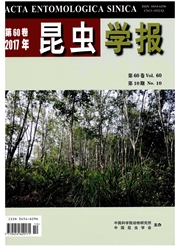

 中文摘要:
中文摘要:
2005年8—11月,在西双版纳热带植物园对寄生对叶榕的佩妃延腹小蜂的产卵行为进行了观察,并解剖雄花前期的隐头果观察小蜂利用瘿花资源情况;对不同年份(2003、2004、2005),不同批次的隐头果内榕小蜂数量进行了统计。结果表明:对叶榕Ficus hispida隐头果内寄生的佩妃延腹小蜂属Philotrypesis的两种榕小蜂——短尾佩妃延腹小蜂P.pilosa和长尾佩妃延腹小蜂Philotrypesis sp.,都是在果外利用长的产卵器刺穿隐头果果壁将卵产于果中雌花子房内。它们不能为寄主榕树传粉,为非传粉小蜂。短尾佩妃延腹小蜂的产卵时间与传粉榕小蜂接近,几乎与传粉榕小蜂同时到达隐头果产卵,该时期隐头果可供其产卵2天;而长尾佩妃延腹小蜂的产卵时间较晚,在传粉榕小蜂产卵后的第6天开始到果外产卵,并可持续产卵约一周时间。对叶榕雄花期雄果中的瘿花子房由于花梗长度不同而明显分为3层:果壁层(具短花梗),中间层和果腔层(具长花梗)。短尾佩妃延腹小蜂和长尾佩妃延腹小蜂在紧靠果壁的子房果壁层中分布最多,而很少存在于果腔层的瘿花子房内。在自然情况下,短尾佩妃延腹小蜂和长尾佩妃延腹小蜂寄生榕果的比率因季节和植株个体不同而变化。但无论是对榕果的寄生比率还是单果内寄生的数量,长尾佩妃延腹小蜂一般均比短尾佩妃延腹小蜂高,这可能与长尾佩妃延腹小蜂群体在隐头果上产卵时间比后者更长有关系。
 英文摘要:
英文摘要:
From August to November 2005, the ovipositing behaviour of two non-pollinating fig wasps of Philotrypesis in Ficus hispida figs were observed, the figs at post-flora phase were dissected to test the distribution patterns of galls used by the two non-pollinating wasps, and the quantity of wasps in figs were counted from different fig crops of three different years. The results indicated that Philotrypesis pilosa and Philotrypesis sp. (probably a new species undescribed) oviposit from outside the figs and use their long ovipositors to reach the ovules inside. Both are not able to pollinate for their hosts, so they are non-pollinating fig wasps. P. pilosa oviposits in the same day as the fig wasp pollinators, and they can oviposit on the syconia for two days. Philotrypesis sp. oviposits much later, 6 to 13 days later than the pollinators. The ovaries inside the post-floral phase male syconium of F. hispida were classified into three layers according to pedicel length: wall layer (with short pedicel), intermediate and inner layer (with long pedicel ). The offspring of two Philotrypesis species prefer to grow in the ovaries close to the wall layer, and rarely exist in the ovaries in inner layer. Under natural conditions, the ratio of the figs of F. hispida with P. pilosa and Philotrypesis sp. varied between different seasons and sampled trees. However, the ratio of the figs with Philotrypesis sp. and the number of the offspring of Philotrypesis sp. in a syconium were all higher than those of P. pilosa. This may be related to the fact that Philotrypesis sp. has a longer time to oviposit.
 同期刊论文项目
同期刊论文项目
 同项目期刊论文
同项目期刊论文
 期刊信息
期刊信息
